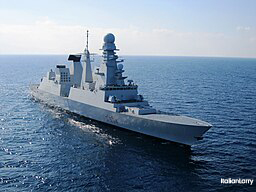
Tension is still rising in the Red Sea, where for months now the Shiite armed group of the Houthi, supported by Iran, has been carrying out drone and missile attacks against Israel and against ships going to and coming from the Suez Strait, with the aim of seriously disrupting international maritime trade that transits almost globally in that area.
A crossroads of crucial trade routes and a point of convergence for geopolitical interests, the Red Sea is in fact an area of great strategic importance.
It was in this critical context that the European operation called ‘ASPIDES’ was launched in February, with Italy taking on the role of operational command, alongside France, Germany, and Greece (which instead has strategic command).
Aspides will be a purely defensive naval mission, unlike those active in the same area and led by Great Britain and the United States.
The EU-led one has been announced as an operation with the sole purpose of ensuring the proper functioning of international maritime trade in that geographical area.
For this reason, it may provide for the use of force, but such use must only be exercised in response to Houthi attacks; in essence, it is only allowed to open fire for purely defensive purposes.
And just recently, the Italian Navy ship, the Cacciatorpendiniere Caio Duilio, came under attack from Houitian drones, drones that were promptly shot down with artillery fire.
The other ships currently involved in the operation are the French Frigate Louise-Marie, the German Frigate Hessen and the Greek Frigate Hydra
But why is this mission so important for EU countries and Italy in particular?
Approximately 40% of Italian maritime exports and as much as 12% of world maritime exports pass through the Suez Canal with container ships, ships that contain both manufactured and rapidly perishable products.
From an economic point of view, the Houthi threat has led to a rapid and disproportionate rise in transport costs, increases of almost 400%.
These increases are caused by two different factors: on the one hand, the ever higher costs charged by the insurance companies of the ships that decide to venture there, and on the other, the increase in the costs of fuel, chartering and crew of the ships that, in order to avoid risks, opt for the ‘broad round trip’ that involves circumnavigating the Cape of Good Hope with a consequent increase in miles and days of navigation.
Hence the need to intervene in a timely manner, trying to put a brake on the inflationary and speculative spiral that has been created, trying to stop Iran’s expansionist aims and, last but not least, with the desire to reaffirm the presence of the European Union in that geographical area.
The operation has only just begun, the hope is that it does not escalate quickly.
FeMo



 Subscribe
Subscribe